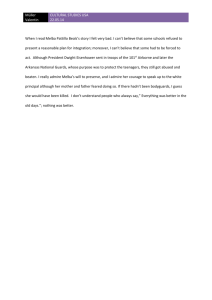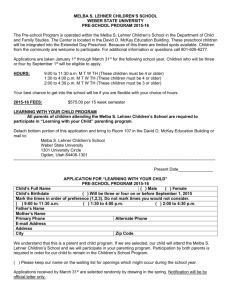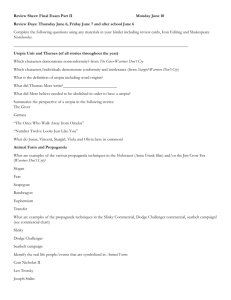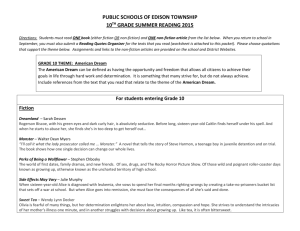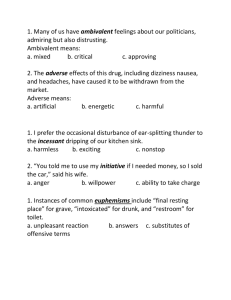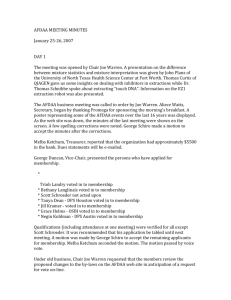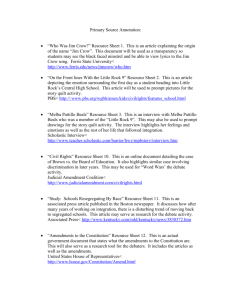Study Guide
advertisement
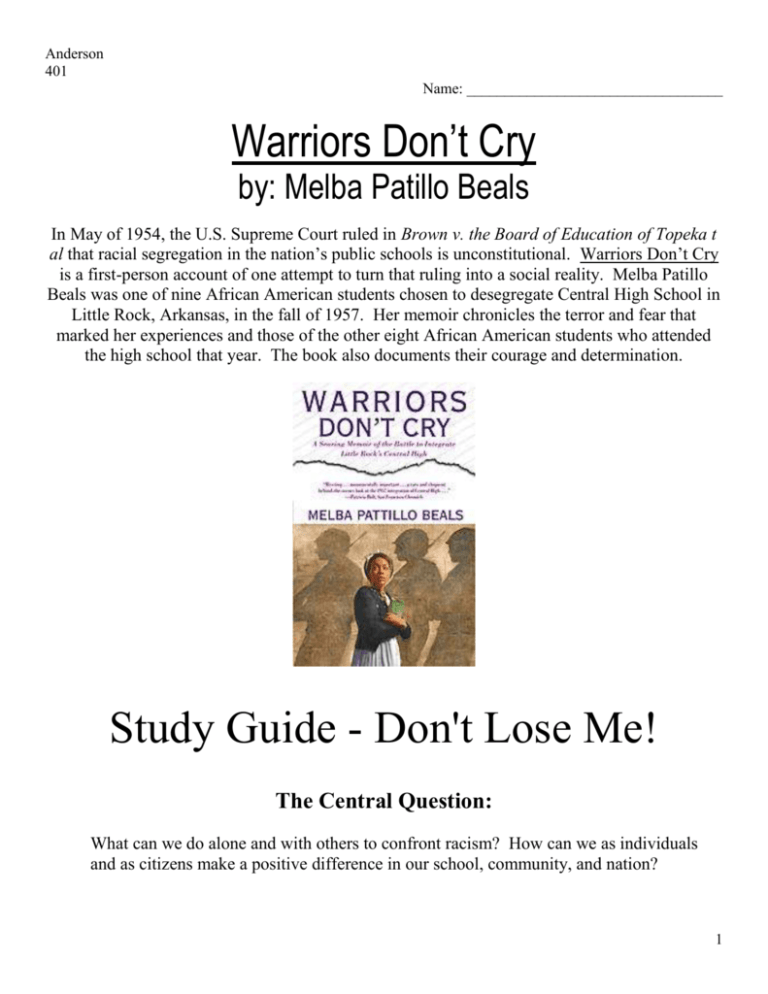
Anderson 401 Name: __________________________________ Warriors Don’t Cry by: Melba Patillo Beals In May of 1954, the U.S. Supreme Court ruled in Brown v. the Board of Education of Topeka t al that racial segregation in the nation’s public schools is unconstitutional. Warriors Don’t Cry is a first-person account of one attempt to turn that ruling into a social reality. Melba Patillo Beals was one of nine African American students chosen to desegregate Central High School in Little Rock, Arkansas, in the fall of 1957. Her memoir chronicles the terror and fear that marked her experiences and those of the other eight African American students who attended the high school that year. The book also documents their courage and determination. Study Guide - Don't Lose Me! The Central Question: What can we do alone and with others to confront racism? How can we as individuals and as citizens make a positive difference in our school, community, and nation? 1 Anderson 401 Journal: Have you ever had to adapt to a new culture (school, club, group of friends etc.)? How did you feel when you first entered the new culture? Was it difficult to adapt? Did you manage to assimilate yourself? Did you have help from others? Explain your story. Look at the cover of the book and make some predictions about the story. Use the pictures, the title, the author, and the words that are there to help you with some educated guesses. What does the title make you think of? How would you describe the girl on the cover? Why do you think there are soldiers present? What do you think the main conflict in the story will be? Why is there so much "battle" language? What tone does that set for the story? Vocabulary: In your journal, define the following terms. Write each word and the definition together. Racism Segregation Discrimination Integration Prejudice Nonchalant Benevolent Adamant Meticulous Ostracized Feigned Adversaries Insolent Parody Chastising Copious 2 Anderson 401 Key People / Dates / Events Next to the each person/place/thing write down a general description. Think specifically about why these are important parts of the Civil Right Movement or America in the 1950's. Orval E. Faubus NAACP Rosa Parks Martin Luther King Jr. Little Rock, Arkansas Montgomery, Alabama National Guard Malcolm X Woodrow W. Mann Thurgood Marshall Dwight D. Eisenhower U.S. Supreme Court Mahatma Gandhi Civil Rights movement Non-violent protests 3 Anderson 401 On the line next to each quote, write whether you A-agree; D-disagree; or R-If you can relate to the statement. Below the quote: explain your response. 1. ____ “Folks aren’t born expecting segregation, prepared from day one to follow its confining rules.” (6) 2. ____ “I felt sad and angry that there was no hope that things would ever get any better” (37). 3. ____ “They’ll [whites will] always be in charge if I don’t go back to Central and make the integration happen” (56). 4. ____ “God’s warriors don’t cry, ‘cause they trust that he’s always by their side” (57). 5. ____ “Freedom is not integration” (83). 6. ____ “Entering the door was like walking into a zoo with the animals outside their cages” (141). 7. ____ “As we drove home, I looked forward to shedding my day like soiled clothing” (144). 8. ____ “I yearned for someone, anyone, to say a friendly word to me” (149). 9. ____ “It takes more time than I thought. But we’re going to have integration in Little Rock” (161). 4 Anderson 401 10. ____ “Once I was seated in class, I felt I could take a deep breath. For the moment at least I was off the front line of battle in the hallway” (168). 11. ____ “How can we run to the office every time we want help. Somebody could be beating one of us at the far end of the hall, and we’d have to wait until they finished and let us up so we could come here to report it” (170). 12. ____”I couldn’t go to lunch in the cafeteria because that is becoming the main place for them to get me” (177). 13. ____ “We were all aware that school officials were waiting for any excuse to kick us out” (208). 14. ____ “You can never in a lifetime count on another human being to keep you from being lonely” (209). 15. ____ “It is so hard sometimes. I don’t know if I can make it” (209). WRITING RESPONSE: Pick one of the statements above to elaborate on. Make a personal connection to your life and explain why you chose the statement that you did. Make it meaningful and true to you. 5 Anderson 401 Have you ever been with your friends when they did something you knew was wrong? How did you react? Did you speak up? Join in? Would you do things differently now looking back? Why do you think it is hard to speak out when you feel something isn’t right? Can something be both good and bad at the same time? Explain. 6 Anderson 401 As a class and as we read the novel, we’re going to come up with a list of ten positive personality traits and a list of ten negative personality traits. Each trait must connect to at least one character. Keep track of our list on this chart. 7 Anderson 401 Chapters 1-4 (pgs. 1-45) 1. Describe Melba 2. What do her mother and father do for a living? 3. How would you describe her relationship with her peers and those in town? 4. Melba writes: “Black folks aren’t born expecting segregation … Instead the humiliating expectations and traditions of segregation creep over you slowly stealing a teaspoon of your self-esteem each day.” (page 3) How does Melba learn those expectations and traditions? 5. What does Melba know about segregation by the time she has reached the age of eight? 6. By the age of twelve? 7. What happens to Melba while walking home from school? 8. How do the adults in her family respond to the incident? Why do they not call the police? 9. What is Melba’s relationship with her grandmother? 8 Anderson 401 In this chart, you need to describe Melba in Four different ways: how she acts, feels, looks, and what she says. Use specific examples from the book to back up your answers. Acts: Feels: 1. 1. 2. 3. 4. __________ _____ _____ _____ _____ _____ __________ _____ _____ _____ 2. 3. 4. Looks: Says: 1. 1. 2. 3. 4. __________ _____ _____ _____ _____ _____ __________ _____ _____ _____ 2. 3. 4. __________ _____ _____ _____ _____ _____ __________ _____ _____ _____ __________ _____ _____ _____ _____ _____ __________ _____ _____ _____ 9 Anderson 401 10. Why does Melba volunteer to go to Central high? 11. Why does Melba not tell her family that she has volunteered to go to Central High? 12. What did the chosen students have in common? 13. Based on his words and actions, what do you think Faubus’ attitude toward integration is? 14. What effect do you think his words have on black and white citizens of Little Rock? Chapters 5-9 (pgs. 45-105) 15. Why does Melba’s mother insist that they keep their encounter with the mob outside Central High School a secret? 16. How does keeping the secret affect Melba in the weeks that follow? 17. Melba’s grandmother likens her to a “warrior on the battlefield for your Lord.” What is a warrior? How is a “warrior for one’s Lord” different from other warriors? 18. In what sense are Melba and the other eight students warriors? 10 Anderson 401 19. What advise does Melba’s grandmother give her while she is crying? 20. How does Melba characterize the way that individuals and groups in Little Rock, both black and white, respond to the crisis? 21. What role do the media seem to play in the crisis? 22. On page 83, Melba describes an ad. What is the message of the ad? 23. What is Melba’s response to the ad? 24. What qualities does Melba attribute to Thurgood Marshall? Which of these qualities does she most admire? 11 Anderson 401 Story_________________Author___________________Character_________________ Brief Description of Character: (M)Choose One of the following responses: I connect most with this character I have the least respect for this character This character can best be described as _________ character I respect this character the most I can relate most to this character I feel the worst for this Because_________________________________________________________________ Three reasons/proof E Reason L WHY (explain how it proves your main idea 1. 1. 2. 2. 3. 3. My four favorite transitions: 1. 2. 3. 4. 12 Anderson 401 Chapters 10-13 (pgs. 106-145) 25. How do the adults at Central High – principal, vice principal, teachers - respond to the arrival of the African American students? 26. At the end of her first day at Central High, Melba includes two white men in her prayers. Who are they? Why does she include them? 27. What is the response of the white students to integration at Central High? 28. What part do you think that peer pressure plays in determining how the white students respond to the African American students? 29. What do Melba’s remarks about being both proud and sad while being escorted into school by federal troops indicate about her sense of herself as an individual citizen? 30. How do Melba’s dealings with the press help her to find her voice? 13 Anderson 401 Create an “I DO NOT UNDERSTAND” POEM 1. Begin the poem with “I do not understand.” 2. List three things you do not understand about the world or people. 3. Name the thing you do not understand most of all. 4. End with an example of something you do understand. Example: I do not understand why people must have revenge why some people live for drugs why others live for money But most of all I do not understand why people don’t believe we are running out of oil (I still see drivers burning rubber driving well over 55 going to work alone like kings in their royal cars). What I understand most are people who are depressed who see a dismal future where the world’s light is extinguished on the altar of greed each person demanding his own corner of the planet and saying to hell with everyone else I do not understand But most of all I do not understand What I understand most 14 Anderson 401 Chapters 14-20 (pgs. 146-220) 31. Study the entries in Melba’s diary. What does it suggest about the way that attitudes began to change? 32. What does Melba’s diary entry on page 109 suggest about Melba’s feelings about school? Find at least 2 examples of how those feelings are beginning to change? 33. How does Melba’s enrollment at Central High affect her relationship with her old friends? 34. How do NAACP officials want Melba and other students to respond to harassment? 35. Why do you think they advise the students to avoid retaliating? 36. How successful are Melba and the other students in following those instructions? 37. How do you explain Minijean’s response to the boys who taunt her? Is it an act of defiance or desperation? 38. What is the short term effect of her action? What do you think the long term effect will be? Chapters 21-24 (pgs. 221-261) 39. Identify the strategies Melba and the other students develop in response to harassment at school. What are the advantages of each? Drawbacks? 40. How does Melba’s grandmother suggest that she should disarm her attackers? How effective is this strategy? 15 Anderson 401 41. How do some individuals and groups in the African American community show their support for Melba and the other eight students? 42. Why are other individuals and groups in the African American community critical of efforts of the nine students to integrate Central High? 43. What does their lack of support mean to Melba? 44. Why does Link secretly help Melba elude her attackers? 45. What risks is Link taking in offering Melba his friendship? 46. What risks is Melba taking in becoming friends with Link? 47. Why are Melba’s mother and grandmother suspicious of Link’s motives in befriending Melba? 48. Why does Link want Melba to tell the press that the situation at Central High is improving? What does he hope the result of this will be? 16 Anderson 401 Chapters 25-28 (pgs. 262-312) 49. Why does Link feel responsible for Mrs. Healy? 50. Why do you think his parents do not feel as responsible for her welfare? 51. How does Link’s relationship with Mrs. Healy affect his attitude toward African Americans? 52. How does racism shape Link’s relationship with Melba? 53. To what extent does Link take a stand against racism? 54. How do the people in the community react to Ernest at graduation? 55. What does Ernest Green’s graduation from Central High mean to African Americans in Little Rock? 56. Why is Ernest graduating such concern for the segregationists? 57. Why is Melba so committed to returning to school in September? 17
